- Handling Your Child's Dental Emergency
- Tooth Decay in Baby Teeth
- Your Child's Teeth
- Healthy Smiles for Mother and Baby
- Baby Teeth: When They Come In, When They Fall Out
- Your Child's First Visit to the Dentist
- Why Baby Teeth Are Important
- Your Child's Teeth: Ages Six–12
- Your Child's Teeth: From Birth to Age Six
- Your Child's First Dental Visit
Starting Your Child's Dental Journey: The Importance of Early Visits
Establishing a routine of regular dental checkups early is critical to ensuring your child's lifelong oral health. Both the American Academy of Pediatric Dentistry and the American Dental Association recommend that your child's first visit to the dentist should occur when their first tooth emerges or no later than their first birthday. The health of baby teeth is crucial, as cavities can form soon after they erupt. By familiarizing your child with the dentist from an early age, you are setting them up for a future of positive oral care experiences.
The First Dental Visit: What to Expect
The first trip to the dentist is a well-being checkup for your child's teeth. It's important for this visit to be stress-free and pleasant to create a positive association with dental care. Waiting until a dental problem, like pain or discomfort, can make the visit more challenging for your child. Introducing your little one to the dental office early helps prevent this and ensures they are more comfortable with routine visits as they grow.
Tips to Make the First Visit a Success
To create the best experience for your child's first dental visit, consider these tips:
- Choose the right time: Schedule the appointment when your child is typically well-rested and in a good mood, avoiding nap times.
- Stay upbeat: Any anxiety you feel about dental visits can be passed on to your child, so approach the appointment positively.
- Avoid bribery: Don't use the dentist as a bargaining tool or threat. Dental care must be seen as a standard, positive part of life.
- Make it fun: Treat the visit as a special outing to help your child associate the dentist with positive experiences.
Development of Baby Teeth
Baby teeth, also known as primary teeth, generally start to appear around six months of age, with most children having a complete set of 20 by age three. These teeth play a vital role in your child's development, helping with speaking, chewing, and maintaining space in the mouth for adult teeth. If a baby tooth is lost too early, it can lead to alignment problems when adult teeth start to emerge.
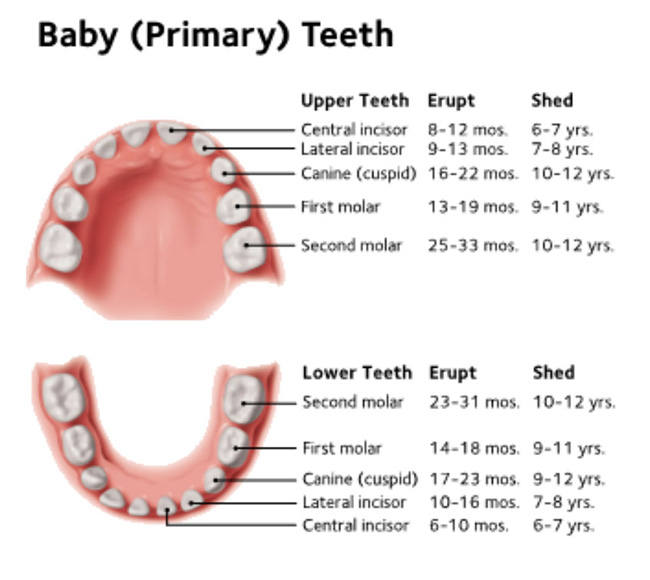
Creating a Dental Home
Starting dental visits early helps establish a "dental home" for your child. This is the dental practice where your child will receive consistent care throughout childhood. Regular visits let the dentist know your child's oral health needs and track their development. At these appointments, your child's dentist can guide brushing, diet, and fluoride use, ensuring a solid foundation for oral hygiene.
Preventing Tooth Decay in Baby Teeth
Tooth decay is one of the most common dental issues in young children, and it can start as soon as teeth emerge. Sugars in the formula, breast milk, and fruit juices can linger on your baby's teeth, turning into acids that damage the enamel. Over time, this can lead to painful cavities that, if left untreated, can cause infections that may affect your child's overall health.
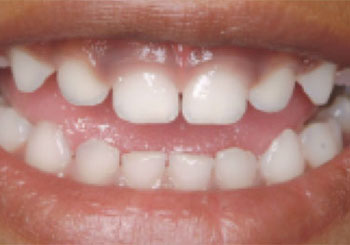
Healthy baby teeth
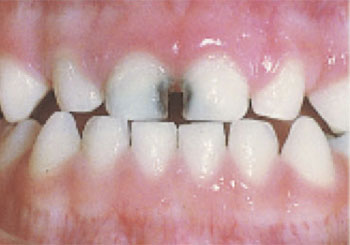
Moderate decay
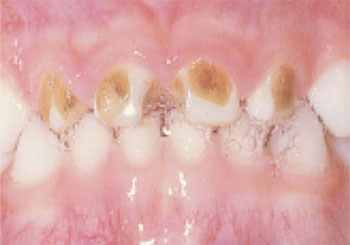
Moderate to severe decay
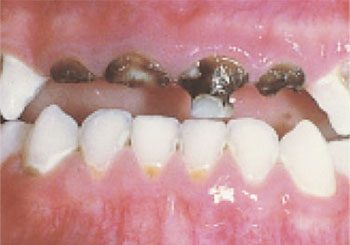
Severe decay
Steps to Prevent Tooth Decay
Fortunately, there are several ways to protect your child's teeth from decay:
- Breastfeeding care: Wipe your baby's gums with a damp cloth after each feeding. Once their first tooth appears, clean it with a soft baby toothbrush.
- Limit sugary drinks: Avoid giving your child sugary drinks, including juice, and do not let them sip on these drinks throughout the day. Water is the best option.
- Healthy snacks: Provide your child with nutritious snacks instead of sugary or sticky foods that can cling to teeth.
- Careful use of pacifiers: Keep pacifiers clean and avoid dipping them in sweet substances. Be mindful of passing bacteria from your mouth to your child's.
Fluoride and Sealants: Extra Protection for Your Child's Teeth
Fluoride is a natural mineral that helps to strengthen tooth enamel and prevent decay. Your child's dentist can help determine whether your child is getting the right amount of fluoride from toothpaste or tap water. Additionally, dental sealants — thin coatings applied to the chewing surfaces of the back teeth — can provide an extra layer of protection against cavities. Your child's dentist can advise if these treatments are appropriate based on your child's needs.
Start Early for a Lifetime of Healthy Smiles
The earlier you establish good dental habits and routine visits, the better your child's chances for a lifetime of strong, healthy teeth. Regular dental checkups and good oral hygiene at home will help your child avoid pain, cavities, and other dental issues. By setting the foundation early, you are equipping your child with the tools for long-term oral health. Consult your dentist for more helpful tips on maintaining your child's dental health. Make oral care a priority from day one.
Visit Our Office
Office Hours
- MON8:30 am - 5:00 pm
- TUE8:30 am - 5:00 pm
- WEDClosed
- THUClosed
- FRI8:30 am - 5:00 pm
- SAT9:00 am - 2:00 pm
- SUNClosed